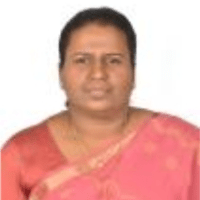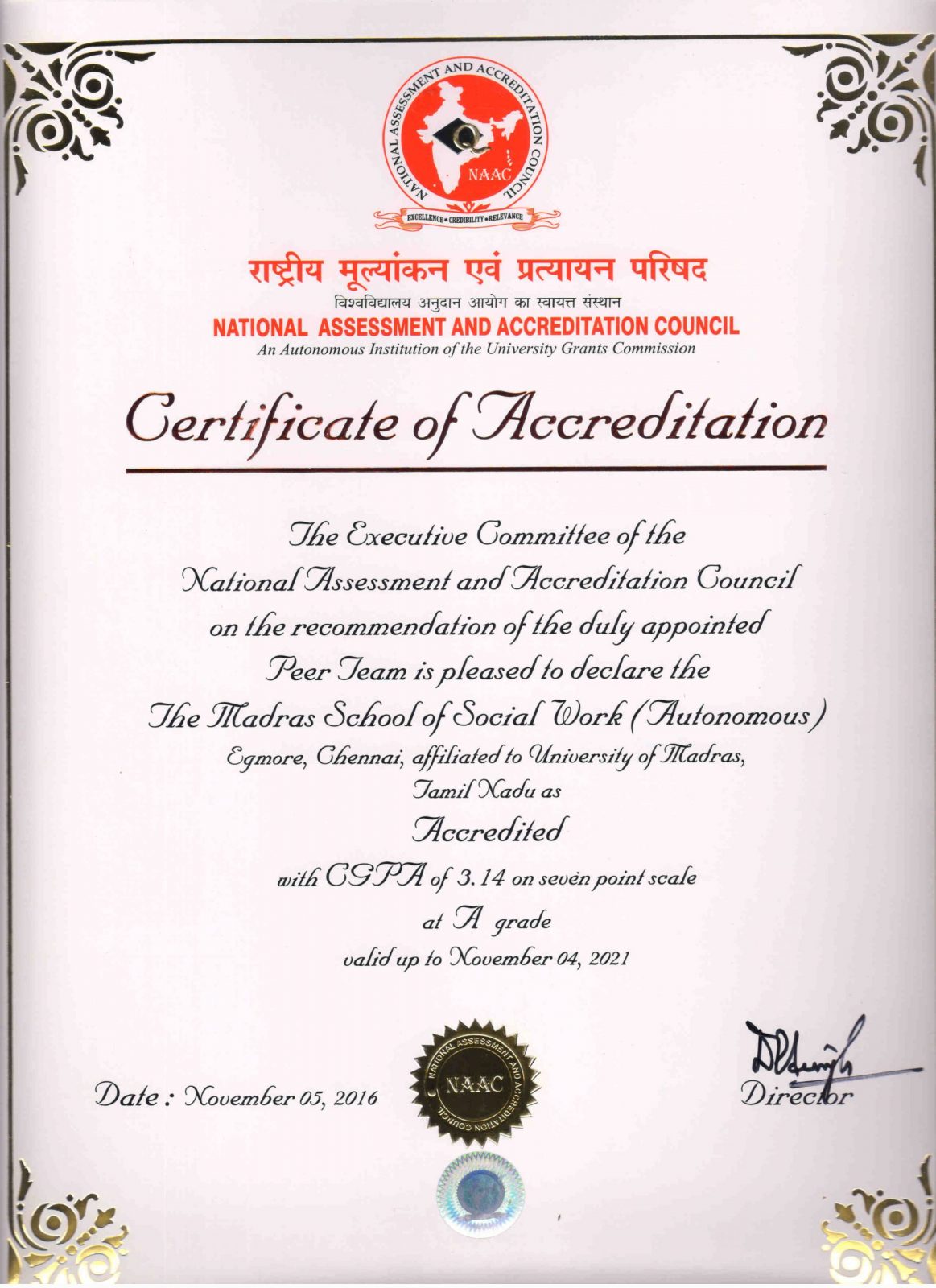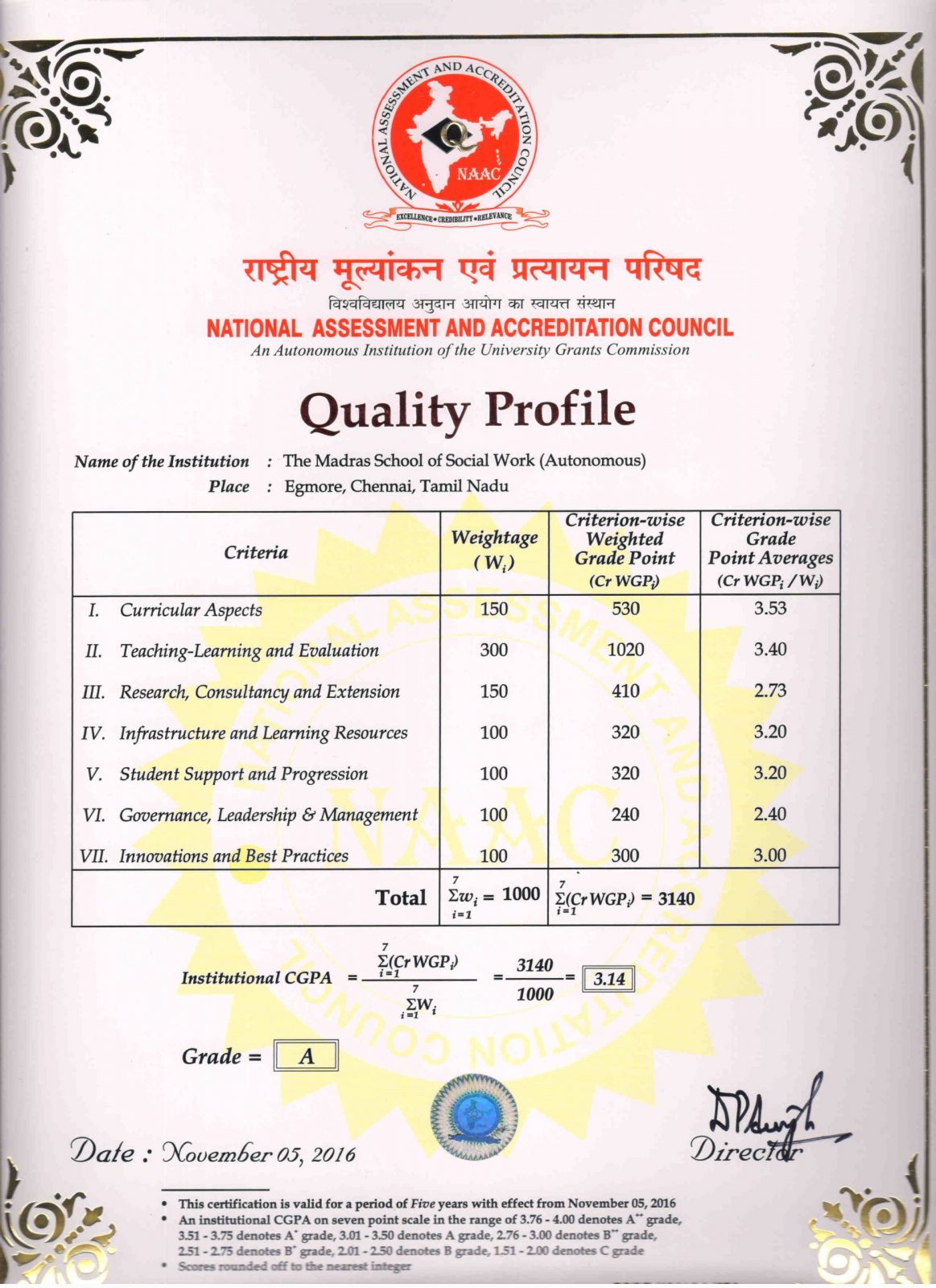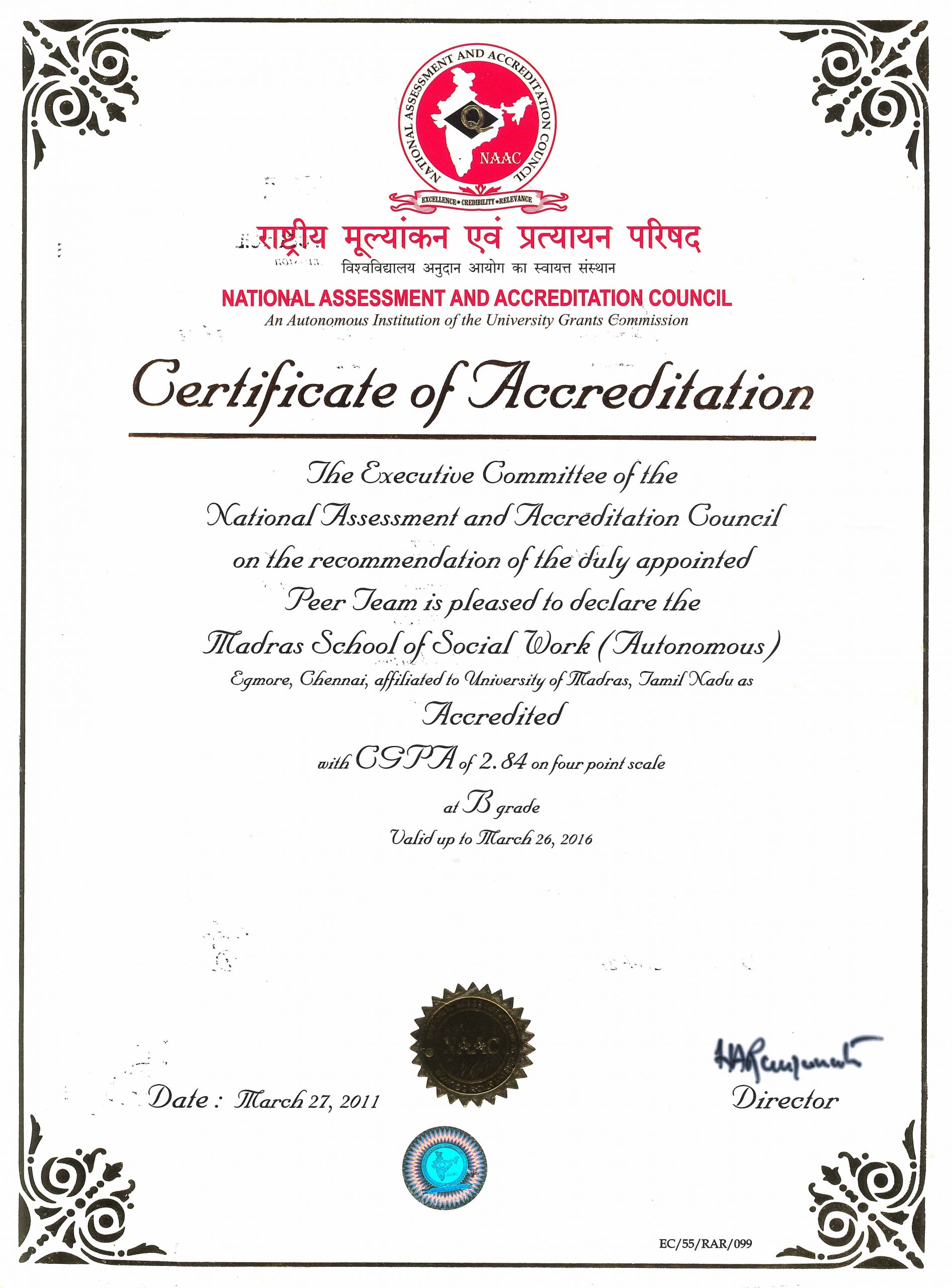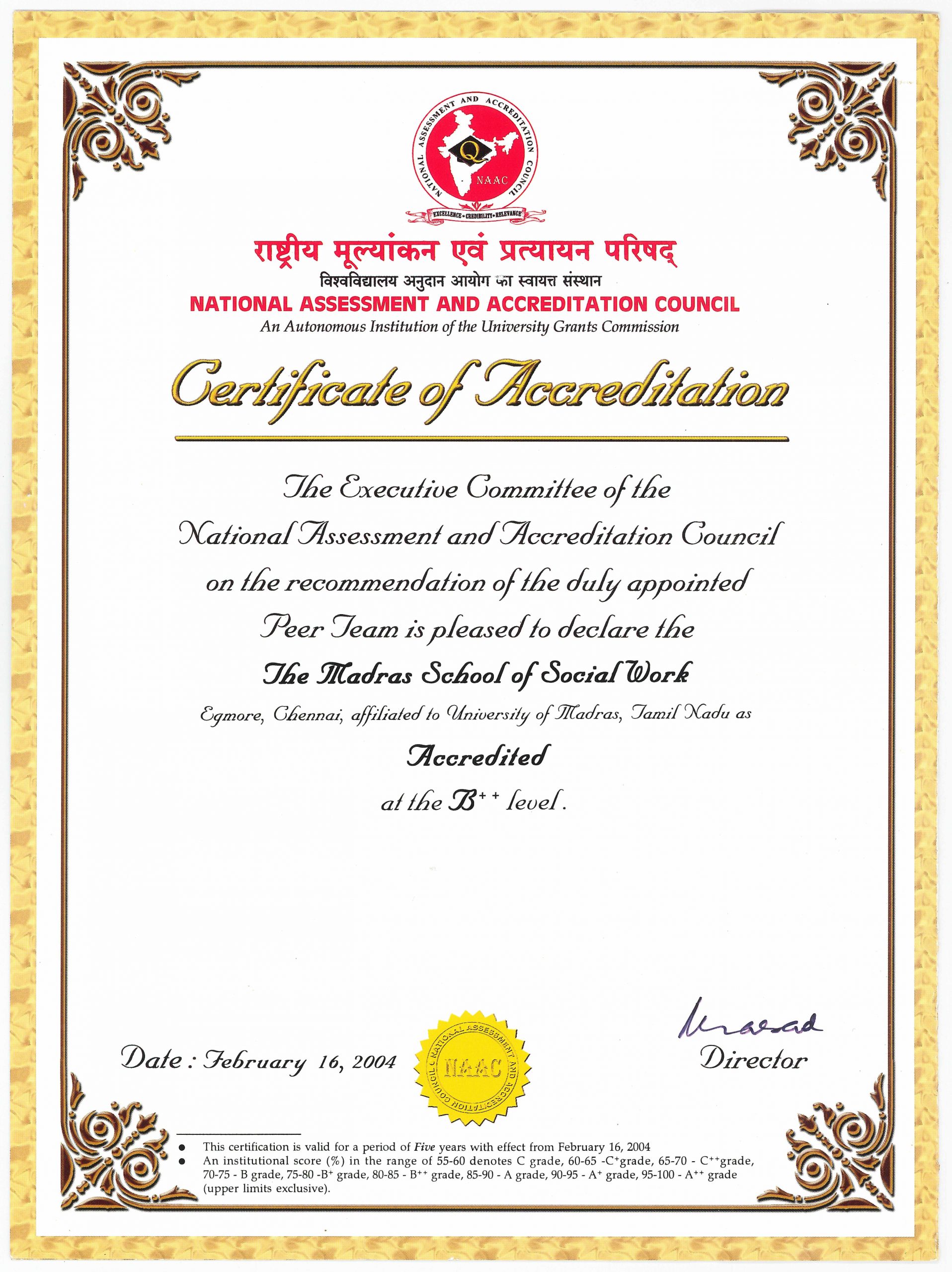Internal Quality Assurance Cell (IQAC)
In accordance with the UGC and NAAC guidelines, the Internal Quality Assurance Cell (IQAC) of Madras School of Social Work was established in the year 2007 to initiate, monitor, evaluate and report on relevant measures to upgrade the quality of teaching, learning, evaluation and research initiatives in social work and other social science disciplines on the campus.
Since quality enhancement is a continuous process, the IQAC has become a part of the institution’s administrative system and works towards the realization of the goals of quality enhancement and sustenance.
Co-ordinator’s Desk
The prime task of the IQAC is to develop a system for conscious, consistent and catalytic improvement in the overall performance of institutions and submitting the relevant reports and data to UGC, AISHE, NIRF, MHRD, and University/college Activity Monitoring Portal of UGC. As a result of the constant effort taken by the IQAC, the college attained the accredited status of “A” by NAAC in 2016 with the CGPA score of 3.14.
Team
IQAC Reports
NIRF Reports
AQAR Reports
UGC Reports
Photo Gallery
Under Construction…
Contact Us
Dr. J. Lakshmi, MSW, PGDHRM, Ph.D
IQAC – Co-ordinator
Phone : +91 9789194639
Email : iqac@mssw.in
Quality Initiative
Quality Policy
As per our founder’s vision, Madras School of Social Work is an eminence in social work field and practice in parlance with world standards and to make the learners to be self-reliant, socially responsible professionals to meet the emerging needs of the society, community and industry by continuous improvements in regular intervals through Board of Studies, Academic Council in all aspects of teaching, field work learning and other onsite/offsite studies & research.
From 2020 onwards, Madras School of Social Work is observing the UGC mandate on Quality.
Objectives
- To impart social work knowledge with more focus on learner-centred process
- To give more priority on value-based education in field work based/skill based.
- To prepare the learners to get the employment in their field.
- To offer job-oriented and administrative skills training as soft skill learning.
- To preserve ethical codes and our national cultural heritage.
Quality Initiatives
- Madras School of Social Work is renowned HEI in social Work for offering student centric courses/initiatives like…, Students’ Induction Programme (SIP), Students’ Entrepreneurship Initiatives, Choice based courses, Students’ Research / Intervention activities, Certificate courses and field work/internship programme.
- All the programmes are based on Learning outcomebasedcurriculum framework and it shall be revised in a regular interval by Board of Studies/Academic Council.
- Madras School of Social Work adopted the ICT based learning tools for effective teaching-learning process in an institutional level.
- Madras School of Social Work imparting Life-skills training/courses to all the students.
- Madras School of Social Work offers its filed work/internship/intervention training in collaborated with Non-Government Organisation (NGOs), Industry, Corporate companies, Government Organisations. And also, every department having community extension projects for providing live social/community/industry experiences to the students.
- Madras School of Social Work adopted five villages under Unnat Bharat Abhiyan for providing handsome village experiences to the students.
- Madras School of Social Work conducts evaluation by the stake holders at the end of the semester in every year. And incorporating their suggestions in the main stream of the programmes/courses in the subsequent Board of Studies/Academic Council.
- Madras School of Social Work having Strong Alumni Network (http://aamssw.com/) and offers alumni scholarship, students’ placement, Field work/internship placements, conducting workshops/seminar/conferences in the relevant filed, offers suggestions to Board of Studies/Academic Council as a member to make changes in the respective curriculum.
- Madras School of Social Work conducts Faculty Development Programmes, Faculty Induction Programmes, Faculty Learning Series, Peer-Learning Sessions to the faculty members.
- Madras School of Social Work gives an opportunity to the Faculty Members to attend Faculty Orientation/Induction courses, Refreshers courses, Short-Term courses and other courses conducted by any UGC-HRDC Centres at state and National Levels, also providing opportunity to learn and do the Annual Refresher Programme in Teaching(ARPIT), Pandit Madan Mohan Malaviya National Mission on Teachers and Teaching (PMMMNMTT) for improvising the standards of teaching.
- Madras School of Social Work promotes the faculty members to take more research projects or funding projects in State and Central government for instance UGC-Minor, Major Research, Scheme for Trans-disciplinary Research for Developing Economy (STRIDE), Impactful Policy Research in Social Science (IMPRESS), DST, Indian Council of Social Science Research (ICSSR) and from the ministries in State and Central Government.
- Madras School of Social Work having dedicated mentoring services.
- As per the UGC-Quality Mandate, Madras School of Social Work extends the service and volunteering activities to similar kind of HEI to get accredited without any hassles.
- Madras School of Social Work conducts regular Internal & External Administrative and Academic Audit (AAA) in every year.
National Institutional Ranking Framework (NIRF)
Best Practices
Best Practices – In Academic Aspects
1. Title of the Practice
STUDENT PARTICIPATION IN PROFESSIONAL FORUM ACTIVITIES
2. Objectives of the Practice
- To facilitate professional networking.
- To facilitate students’ learning through organizing Workshops, Conferences, Seminars Alumni Interactions through Professional Forum Activities.
3. The Context
Each student should attach himself / herself to any professional body / network (ex: PASW, NIPM, ISTD, NHRD Network etc) in his / her field of specialization. And prepare them to knock the campus interview or any other competitive examinations.
4. The Practice
Participation in Professional Forum Activities could also include participation in seminars / workshops organized by Forums of other Colleges, Association, universities, etc
Through this the students not only develop their professional network, but also gain practical knowledge.The students are encouraged to present or publish their research papers in these forums.
5. Evidence of Success
Such students are asked to present their learnings& experiences to their class mates after the event. Ans also the student should present evidence of participation in at least three different events of such professional bodies / networks before the end of the semester.
6. Problems Encountered and Resources Required
The students could explore more learning after attending such events which can be presented the same to other students which encourage the others to take in part similar events in coming days. Events attended students can easily deliver the subject matters when compare with others. As an outcome of such participations the college has earned a greater number of results in Campus, UGC NET exams, got awareness on other competitive examinations.
Best Practices – Providing Real Exposures Of Different Field Areas
1. Title of the Practice
STUDY VISITS TO COMMUNITY, SOCIETY AND INDUSTRY FOR UNDERSTANDING THE CONCEPTS.
2. Objectives of the Practice
The aim of this objective is to make them aware of their future workplace/field area/research area.
3. The Context
The students are provided with specialization-based Study visits (Similar to Study Tour) to four organizations in and around Chennai during the course particularly in their third semester based on their thrust areas of the field work for better understanding with real time exposure and experiences to collect / gather from the visits.
4. The Practice
The students are facilitated to understand organizational focus areas and challenges and learn their best practices. Since the study visits are done immediately after the theoritical orientation for the second year, it serves as a stimulus for better understanding of prospective field work organizations with much rigor and specialization focus.
In this process, learners are helped in planning, implementing and evaluating learning experiences under the guidance of their faculty supervisor.
5. Evidence of Success
The students are able to analyze the best practices of each organization what they visited. This helps them in presenting themselves during placement interviews.
6. Problems Encountered and Resources Required
Clarification of their misconceptions / misunderstanding on the concepts with their real exposures during the Study visits to the field experts with its functioning & process. This would be a group learning experiences inculcated by the field escorts along with filed experts. During their travel they are discussing with all sorts of doubts to the field escorts and it can be clarified at the time study visit spot areas.
Conducting Action Research Through Project Field Work
1. Title of the Practice
Project Field Work
2. Objectives of the Practice
- To indoctrinate the students towards the social issues through action research.
- To address social issues through street play, puppet show or other suitable interventions.
- To acquire skills in recording and documentation.
3. The Context
Project field work is a unique component of the field work programme adopting the model of “Instruction- Training- Skill development- Presentation” by involving the internal faculty and experts / professional trainers from outside for specific skill development (Community interaction & communication skills) among the field work trainees.
This component involves students in small groups working intensively on a relevant social issue with study and action components to highlight the issue and to take appropriate action possible given the time and resources within their command.
4. The Practice
In this learning component, the students are given an opportunity to learn community interaction and presentation skills through:
1) Street play & Puppet show workshop cum training sessions for a period of 2 weeks.
2) The students thereafter (during the next 2 weeks of the project field work period) will be put under the supervision of an internal faculty supervisor. Under the guidance and supervision of the faculty supervisor the project team should design a suitable programme to spread a social message of their choice in the community setting.
3) Presentation and Documentation of the project undertaken.
Basic skills necessary for social work practice such as, community interaction skills, Communication skills, Presentation skills, analytical skills, Team work, Project planning and implementation; Leadership, initiative and motivation; Coordination and cooperation; Identification and mobilization of resources; Implementation and evaluation; Communication, Public relations and Liaison; Documentation and presentation.
5. Evidence of Success
The urban slum community are generally selected for conducting project fieldwork. During the last five years the student trainees focused on various social issues starting from the identifying the socio-economic status of the community to addressing the issues like child abuse (physical), domestic violence, alcohol, drug abuse and also participation in thefts.
In many cases the student trainees address issues not just through street play or puppet show; but also make the community to write a petition to the concerned officials.
6. Problems Encountered and Resources Required
The students in the beginning find that the members of the community are reluctant to answer or identify the local social issues of the area. Conducting Action research to encounter the existing problem of the society/community with the help of Government/Non-Government organizations. As an outcome of that action research to conduct awareness campaigning, Signature campaigning, Signing petitions, Human Chains, Protests, rallies, hoarding, flash-mobs and other sorts of attention campaigning to encounter problems what the people faced.
Best Practices – Community Extensions
1. Title of the Practice
ADOPTED VILLAGES FOR COMMUNITY EXTENSIONS STUDY/RESEARCH.
2. Objectives of the Practice
- To provide exposure on rural setting to the students from urban areas.
- To conduct the study / research to find out the requirements of the villagers.
- To provide the awareness on social evils among the villagers.
3. The Context
The college had a community extension project at Karlambakkam village at Thiruvallur District for the last 50 years. The students are placed to exercise their field learning on rural areas in the adjacent areas. From 2018, adopted the nearby Five villages for conducting our interventions and village survey under Unnat Bharat Abhiyan. As an outcome of this survey college is arranged to donate five tailoring machines to the villagers to run tailoring coaching in the main village at Karlambakkam on 10th February 2021 for giving training to make cotton masks and gloves as a part of Skill India campaigning during the Covid-19 pandemic. As per the Government SOPs the college conducted the series of Awareness campaigning on Covid-19 to protect them on their own.It was greatly appreciated by the officials of the Panchayat Board.
4. The Practice
The Villagers are now trained with self-dependent in all sort of skills in tailoring and run their own tailor shop for their livelihood at their villages. Our students are monitored with their progress and arranging the loan to them with the help of NGOs, Grameen Bank, Cooperative bank for running tailoring shops. Agriculture is failed in this area due to insufficient monsoon in 2019 and immediately in the next year Covid-19 pandemic also heavily affected their livelihoods. As an outcome of the continuous effort made by the college, the villagers are now self-dependent to run their life. The students are also doing their filed work and research to monitor their progress and promoting the awareness given by medical professionals on the pandemic with the collaboration of the Government Hospital. At the end of the session, they are served with Herbal Immunity Booster Hot Water (Kapasurakudineer).
5. Evidence of Success
As an outcome of the survey conducted under Unnat Bharat Abhiyan and continuous effort made by the college, the villagers now running their tailoring coaching center on their own to train younger ones and arranging for employment in nearby areas and cities. This continuous effort is escalating their livelihood in a sustainable manner from 10th February 2021 onwards during the lockdown period for earning from home concept. As an outcome of the awareness campaigning, these villagers are not affected much during the pandemic.
6. Problems Encountered and Resources Required
Initially the college facing difficulties to identify the sponsors for Tailoring machine. After the initiative made by the IQAC the college has given five Tailoring machines to the villagers to run the tailoring coaching center with coaching staff. Now the first batch learners are deemed to be a trainer for that Tailoring center. Even they are required more number of tailoring machines to run a Tailoring coaching center by accommodating more villagers to trained.


















